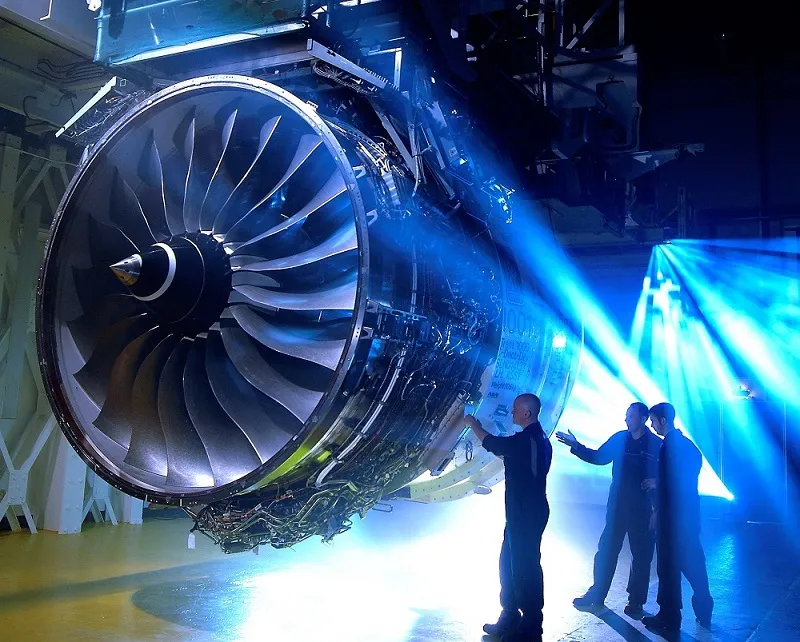
Rolls Royce opts out of Boeing 797 program
Mar 03, 2019

Rolls Royce has decided to withdraw from Boeing's 797 program, a mid-range aircraft initiative aimed at filling a gap in the market for new, fuel-efficient planes. This decision comes amid growing concerns about the financial viability of the program and the competitive landscape of the aerospace industry. Rolls Royce's exit is seen as a strategic move to focus resources on its core business areas and ongoing projects, particularly in the development of sustainable aviation technologies. The withdrawal may impact Boeing's plans for the 797, as Rolls Royce was expected to provide engines for the aircraft.
The aerospace industry has been closely watching the developments surrounding the Boeing 797 program, particularly after Rolls Royce announced its decision to opt out. This decision has raised several questions about the future of the aircraft and the implications for both companies and the marketplace. Rolls Royce, a prominent player in the aerospace sector, has historically been known for its advanced engineering and high-performance engines, making their withdrawal from the program a significant topic of discussion.
Understanding the Boeing 797 Program
The Boeing 797 program was conceived to fill the gap between the narrow-body and wide-body aircraft markets. It was expected to cater to airlines seeking a versatile, efficient, and cost-effective solution for medium-haul routes. The aircraft was projected to feature advanced technology, improved fuel efficiency, and enhanced passenger comfort. The involvement of leading engine manufacturers like Rolls Royce was crucial to the program's success.
Reasons Behind Rolls Royce’s Withdrawal
Rolls Royce’s decision to step back from the Boeing 797 program can be attributed to several factors:
| Factor | Details |
|---|---|
| Market Demand | Rolls Royce assessed the current market trends and realized that the demand for the 797 may not align with their long-term strategic goals. |
| Resource Allocation | The company decided to focus its resources on other projects that promise better returns on investment, such as the development of sustainable aviation technologies. |
| Partnership Dynamics | Internal discussions revealed concerns regarding the partnership dynamics within the Boeing 797 program, prompting Rolls Royce to reconsider their participation. |
| Financial Considerations | The financial commitments required for the program may have been deemed too high compared to the perceived benefits. |
Implications for the Aerospace Industry
Rolls Royce’s withdrawal from the Boeing 797 program could have several implications for the aerospace industry:
- Impact on Competition: The exit of a major engine manufacturer like Rolls Royce may open the door for other players, such as Pratt & Whitney or General Electric, to fill the void and become primary suppliers for the program.
- Shifts in Technology Development: With Rolls Royce focusing on other projects, advancements in engine technology for the Boeing 797 may slow down, potentially affecting the aircraft's performance and efficiency.
- Market Share Redistribution: Airlines that were considering the Boeing 797 may now explore alternative aircraft options, which could shift market shares among existing manufacturers.
Future Prospects for Rolls Royce
Despite stepping back from the Boeing 797 program, Rolls Royce remains committed to innovation and sustainability in aviation:
- Investment in Sustainable Technologies: Rolls Royce is increasingly focusing on sustainable aviation fuels and hybrid-electric propulsion systems. This commitment could position them as leaders in the green aviation revolution.
- Expanding Partnerships: The company may seek new partnerships or collaborations that align more closely with their strategic vision, allowing them to innovate without the constraints of large-scale programs like the 797.
- Enhancing Existing Product Lines: Rolls Royce can concentrate on enhancing its existing product lines, ensuring they remain competitive in the market while also improving efficiency and reducing emissions.
Conclusion
Rolls Royce’s decision to opt out of the Boeing 797 program marks a pivotal moment in the aerospace sector. While it raises questions about the future of the program itself, it also highlights the complexities of partnership dynamics and market demands in a rapidly evolving industry. As Rolls Royce redirects its focus towards sustainable technologies and innovation, the implications of this shift will likely reverberate throughout the industry, influencing market strategies and competitive dynamics for years to come.
In summary, the aerospace landscape is ever-changing, and decisions like that of Rolls Royce can significantly shape the future of aviation. Stakeholders across the industry will be keenly observing how these developments unfold and what they mean for the future of air travel.
Related Articles

Explore Thailand: The Best Islands to Visit for Paradise, Adventure, and Relaxation

The Ultimate Guide to the Best Islands in Thailand for Your Next Getaway

Do babies need passports? How to get a passport for a newborn

How to get a U.S. passport fast: here’s how to expedite the process

What is Mobile Passport Control: 5 reasons why you should use it

SENTRI vs. Global Entry: A detailed guide

Do you need a passport to go to the Bahamas? Let’s find out

Do you need a passport to go to Mexico? A detailed guide

Do you need a passport to go to Canada? We got the answer

Do You Need a Passport for a Cruise: An Essential Travel Guide

Booster Seat Requirements: All the Rules to Follow in Your Rental Car

What Are the World’s Most Powerful Passports, and How Does Yours Rank?

How to Take a Passport Photo at Home: A Helpful Guide

You've got to have heart! Southwest's new livery

Your opinion: Should water be free on low cost carriers?

Young women bolder than guys as solo travellers
